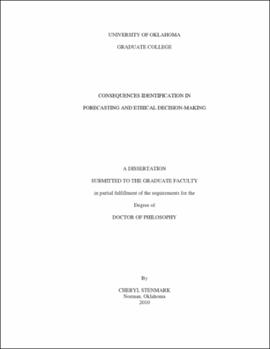| dc.contributor.advisor | Mumford, Michael D | |
| dc.creator | Stenmark, Cheryl Kathlyn | |
| dc.date.accessioned | 2019-04-27T21:36:06Z | |
| dc.date.available | 2019-04-27T21:36:06Z | |
| dc.date.issued | 2010 | |
| dc.identifier | 99329994102042 | |
| dc.identifier.uri | https://hdl.handle.net/11244/319112 | |
| dc.description.abstract | This study examined how the number and types of consequences considered impacts forecasting and ethical decision-making. Undergraduate participants took on the role of the key actor in several ethical problems and were asked to forecast potential outcomes and make a decision about each problem. Performance pressure and environmental conflict were manipulated within the problem scenarios. The results indicated that forecast quality was associated with decision ethicality, and the identification of the critical consequences of the problem was associated with both higher quality forecasts and more ethical decisions. Additionally, the identification of a larger number of consequences was associated with higher quality forecasts. Neither performance pressure nor environmental conflict impacted forecast quality or ethicality of decisions. Theoretical and practical implications of these findings are discussed. | |
| dc.format.extent | 55 pages | |
| dc.format.medium | application.pdf | |
| dc.language | en_US | |
| dc.relation.requires | Adobe Acrobat Reader | |
| dc.subject | Consequentialism (Ethics) | |
| dc.subject | Ethics | |
| dc.subject | Decision making--Moral and ethical aspects | |
| dc.title | Consequences Identification in Forecasting and Ethical Decision-making | |
| dc.type | text | |
| dc.type | document | |
| dc.thesis.degree | Ph.D. | |
| ou.group | College of Arts and Sciences::Department of Psychology | |
